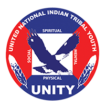
As UNITY celebrates Black History Month, we share this important conversation about supporting Native youth who face lateral oppression based on the color of their skin. Both light and dark skin natives face struggles with feeling like they belong within Indigenous Communities. Join UNITY Alumni and former Female CoPresident LoVina Louie as she facilitates her special guests in this Free Power Hour webinar; brought to you by our partners at the Native Wellness Institute. Watch and Learn tools for how we can help our youth councils navigate through lateral oppression and help address disparities to be more inclusive.
The NUC voted on these issues at the Virtual National Conference for Youth Councils to address during 2020-2021:
- Drug/Alcohol abuse
- Suicide/Self harm
- School Dropout/Education Disparities
- Cultural Identity/Blood Quantum
- Bullying/lateral violence
- Unhealthy home environment
- Human Trafficking/Missing and Murdered Indigenous Women and Girls
- Lack of Positive Role Models
- Poverty/Unemployment/Lack of Resources
- Juvenile/adult incarceration/generational impacts of imprisonment
What Can Youth Councils Do to address these issues:
- Youth Councils are encouraged to share Prevention messages addressing drug and alcohol abuse.
- Youth Councils should share warning signs of suicidal thoughts and resources for persons with thoughts of suicide regularly.
- Youth Councils can encourage educational opportunities and encourage academic achievement.
- Youth Councils are encouraged to make efforts to Creating Belonging for all members, promote inclusion of mixed blood natives in your events and host events that teach and strengthen cultural identity.
- Youth Councils can have community conversations addressing lateral violence, cancel culture and focus on building positive mental health and self esteem for Native youth.
- Youth Councils should help raise awareness on creating healthy relationships and resources for safe places to seek help.
- Youth Councils can share information on how to know the signs of human trafficking, raise awareness on MMIWG and how to keep safe.
- Youth Councils should strive to be role models for younger generations and have guest speakers who Native youth can look up to.
- Youth can share creative ways Native youth have overcome community challenges such as poverty and host workshops on financial literacy and entrepreneurship.
- Youth can openly discus the impacts on generational incarceration. The youth can also work with UNITY Peer Guides to host Town Halls on how to develop a personalized plan to create a safer communities.
If your local Youth Council is currently addressing one of these top ten issues, please share with us by emailing la.buford@unityinc.org and nucec@unityinc.org today! We would like to share your community event with others to empower Native youth to be change agents.
UNITY Alumni: LoVina Louie
LoVina is schitsu’umsh (Coeur d’ Alene) Tribe, nselxcin (Okanogan/Colville), Nimipu (Nez Perce) she is a descendant of Chief Morris Antelope of the schitsu’umsh and Chief Manuel Louie of the Inkaneep Band in Oliver BC Canada. She is a graduate of the University of Idaho where she received her Bachelors in Organizational Sciences with an emphasis in Community and Tribal Wellness. She was recently featured on Lifetime Movie Network 50 Women in 50 States and a speaker at the TEDx Coeur d’Alene event. LoVina is a board member for the Native Wellness Institute, a national trainer and facilitator in youth leadership development, strategic planning, family constellations and community healing and wellness planning. She also has certifications from the Healthy Native Communities Fellowship. She has worked with youth and adults in wellness and healing for over twenty years throughout North America. LoVina is the visionary behind the newly developed and revolutionary exercise series “Powwow Sweat” and co-directed the American Indian Film Festival and Red Nation Film Festival award winning music video “We Shall Remain.” As a former Miss Indian World she travelled to hundreds of tribal communities and this experience expanded her world view and desire to help all Indigenous people. LoVina is a wife, mother, grandmother, daughter, sister, friend and an amazing human being. Her passion and zest for life is infectious.


